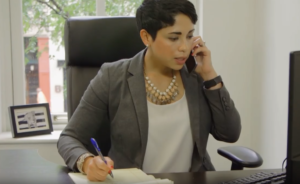DC U Visa Attorney
Because it is available to the largest group of people, U non-immigrant status, or the “U visa,” is the most common type of victim-based application. A DC U visa lawyer can help if you believe you are eligible for U non-immigrant status and you need help with the application process.
The DC U Visa attorneys at our firm are here to help those who have been the victims of crimes. We understand the complex emotions and stress associated with these types of application processes, and we can help clients to ensure that they go through the correct steps needed to file a successful application. Speak with one of our DC immigration lawyers today to learn more about how we can help you through the U Visa application process. En Español.
U Visas for Victims of Crimes
Congress’ intent in creating the U visa was two-pronged.
First, they wanted to provide an incentive for crime victims to call the police when they were victimized, and to assist as witnesses in the investigation and/or prosecution of the crimes. In the past, though many victims wanted to report the crimes, they were afraid to do so because they feared that they would be placed into deportation proceedings or detained by the US Immigration & Customs Enforcement (ICE) if they were not in legal immigration status.
This meant that criminals were at little risk of being caught if they targeted immigrant populations, and it made people living in immigrant communities more vulnerable to victimization. Congress hoped that the U visa would help to incentivize these victims to take an active role in seeking justice for the crimes in which they were victims.
The second prong of Congress’ intent in establishing the U visa was to create a tool for law enforcement to help make contact and connections within immigrant communities. The fear that many immigrants felt towards the police made it difficult for law enforcement to pursue cases and to keep communities safe. For this reason, one of the most important requirements of the U visa is that the victim must have been fully cooperative in the investigation or prosecution of a crime. The links below have more information about the U Visa application process:
U Visa Eligibility
In order to be eligible for a U visa, a victim must prove the following:
- They were a victim of a qualifying criminal activity
- They suffered substantial physical or mental abuse as a result of the crime
- They possess credible and reliable information about the qualifying criminal activity
- They are, have been, or are likely to be helpful in the investigation and/or prosecution of that qualifying criminal activity, and have received a “Law Enforcement Certification” to prove this helpfulness
- The crime they were a victim of violated a U.S. law
Law Enforcement Certifications
The Law Enforcement Certification, which is completed on USCIS Form I-918B, is often the most difficult part of the U visa process. The certification must be signed by a supervising official of an investigative law enforcement agency (usually the police or prosecutor), and it serves as a confirmation that the victim was 1) the victim of a U-visa-qualifying crime and 2) cooperative with the investigation and/or prosecution of the crime. It’s important to note that it is not a requirement for the perpetrator to have actually been convicted of a crime, or even for charges to have been pursued by the prosecutor, in order for a U visa applicant to qualify. Instead, a victim only needs to show that they were cooperative in the investigation or prosecution of the crime, whatever it entailed. Therefore, in some cases, a victim may have been required to give full-blown testimony in a criminal court proceeding, while in some cases all a victim has to do is to call the police to report the crime.
 The process for requesting a law enforcement certification differs widely from state to state, town to town, and district to district. One of the biggest challenges with the U visa (and one of the most important reasons to hire a DC U visa lawyer who is familiar with the law enforcement certification process) is that the decision on whether or not to sign an I-918B form is entirely discretionary. This means that, while certain police and prosecutor’s departments may have policies in place on what types of crimes they will work with and how a victim should apply, some can simply adopt a blanket policy that they will not sign. Many create barriers to applying for the certification, such as only signing off on crimes that occurred within a certain time period. This is where a good lawyer’s advocacy comes into play. Sometimes the decision on whether or not to sign the I-918B comes down to whether the official is convinced that helping the victim is in the best interest of the community, or the DC U visa attorney is able to explain to the official that the U visa is in fact not only a benefit for victims but a tool for more effective law enforcement.
The process for requesting a law enforcement certification differs widely from state to state, town to town, and district to district. One of the biggest challenges with the U visa (and one of the most important reasons to hire a DC U visa lawyer who is familiar with the law enforcement certification process) is that the decision on whether or not to sign an I-918B form is entirely discretionary. This means that, while certain police and prosecutor’s departments may have policies in place on what types of crimes they will work with and how a victim should apply, some can simply adopt a blanket policy that they will not sign. Many create barriers to applying for the certification, such as only signing off on crimes that occurred within a certain time period. This is where a good lawyer’s advocacy comes into play. Sometimes the decision on whether or not to sign the I-918B comes down to whether the official is convinced that helping the victim is in the best interest of the community, or the DC U visa attorney is able to explain to the official that the U visa is in fact not only a benefit for victims but a tool for more effective law enforcement.
Crimes That Could Qualify for a U-Visa
Victims of the following crimes may be eligible for a U non-immigrant visa:
- Abduction
- Abusive Sexual Contact
- Domestic Violence
- Hostage Taken
- Rape
- Sexual Assault
- Trafficking
- Other Related Crimes
Please note that the final item on the U visa list, “Other Related Crimes” means that there are crimes (such as aggravated robbery and even occasionally simple assault) can, in some cases, qualify for U visa status. A DC U visa lawyer with experience in U visa applications can help to determine whether the crime you’ve been a victim of can fall under this list.
Benefits of a U-Visa
 The U visa gives the applicant lawful immigration status in the U.S., and the ability to work and to apply for a Social Security number. It is only valid for 4 years, but after 3 years the applicant becomes eligible to apply for Legal Permanent Residency, or a “green card.”
The U visa gives the applicant lawful immigration status in the U.S., and the ability to work and to apply for a Social Security number. It is only valid for 4 years, but after 3 years the applicant becomes eligible to apply for Legal Permanent Residency, or a “green card.”
Even people who have criminal records or have violated immigration laws can apply for a U visa. However, if an individual has entered the country illegally or has a criminal record which renders her “inadmissible” to the United States, she must apply for a waiver. The waiver is filed on USCIS Form I-192, and requires the applicant to prove that the harm they have done or could do to society is outweighed by the positive factors of their character and case.
Depending on the severity of the criminal or immigration violations, these pardons can be quite complex. It’s important to work with a DC U visa lawyer who is familiar with the requirements and limitations of these applications, and can present the strongest possible case to USCIS.
